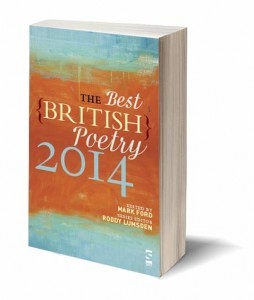
Got some major catching up to do here. It’s a good job I don’t have any competitors in the ‘news on Jon Stone’s recent publications’ stakes.
A short poem of mine, ‘Endings to Adventure Gamebooks 17’, appears in The Best British Poetry 2014, edited by Mark Ford and published by Salt. My name also appears on the cover, since I was parachuted in to handle a large part of the admin and some of the formatting of the book. At the time, I was living with BBP series editor – and my own former editor at Salt – Roddy Lumsden, who had been unwell for much of the year, and I sat in our shared front room frowning over the tabulation of long, intricate, structurally audacious poems by Dom Bury and Sarah Howe.
There are two exciting aspects to the selection of ‘Endings …’ – for me, anyway. Firstly, it’s based on a famous scene in Final Fantasy VII, and is the first time a game-poem of mine has found its way into a mainstream poetry book that seeks to represent the full breadth of the medium. In other words, game-poetry has arrived. (Maybe).
Secondly, it’s from a sequence I’ve been working on for years and years, which I’m convinced is hot stuff, but which I’ve struggled to find a home for. True enough, this particular poem was previously published on The New Statesman website, but it’s almost like it slipped in unnoticed amongst a raft of other game-poems when we were generating pre-publicity for Coin Opera 2.
The sequence owes much to the same Fighting Fantasy adventure gamebooks Nathan Penlington has drawn from for his Choose Your Own Documentary tour. These print-based interactive fictions were written in the second-person and would usually contain one ‘happy’ ending amidst an array of grisly deaths for reader-players who made the wrong choices. Turning to a numbered section, you would find a brief description of your demise, followed by the words ‘GAME OVER’.
Poems in the ‘Endings to Adventure Gamebooks’ sequence are constructed like these numbered sections, but describe the deaths of various fictional and historical figures, including Tintin, Rudolph Hess and the U-boat captain in Das Boot. They make use of a migrating end-rhyme that shifts gradually throughout the poem, always ending in the ‘OVER’ of ‘GAME OVER’. Here’s another example from the sequence, this one on the last days of Chamfort:
53.
The bullet is insincere, the blade contrary,
swayed by an esteem-drunk jury
(for such a weakness there exists no cure).
“Pas aujourd’hui!” they seem to chirp.
Your signature in blood, at least, is sharp.
But dying too, you find now, is farce.
So you write, lighter by about half a face,
never more alive, never less.
Only when a few plays and you are all that’s left
do you depart, as if spending the last of your gift
giving life’s unctuous court the slip.
Foolishness and wit alike submit to sleep.
La mort – un dernier fou à suivre.
Game Over.
I haven’t run the French past any native speakers yet, so it’s probably spectacularly wrong. Or mundanely wrong. Take your pick.